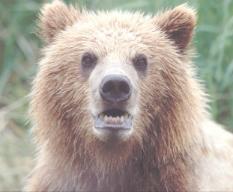
The Asiatic black bear is now listed as vulnerable, therefore six of the eight species of bear in the world are now officially facing extinction.
The smallest, the sun bear, is the latest to be classified as vulnerable on the Red List of Threatened Species. Four other species - Asiatic black bear, Sloth bear, Andean bear and Polar bear - are also listed as vulnerable.
The giant panda is facing the greatest threat and remains in the endangered category. There is least concern over the European brown bear and the American black bear.
The sun bear found in Souteast Asia, Sumatra and Borneo, will be included in the 2007 Red List drawn up by the World Conservation Union (IUCN). Previously it was known as 'Data Defficient' meaning not enough was known about it to give it a classification. Rob Steinmetz, co-chair of the IUCN Bear Specialist Group's sun bear expert team, said: "Although we still have lot to learn about the biology and ecology of this species, we are quite certain that it is in trouble.
"We estimate that sun bears have declined by at least 30 per cent over the past 30 years (three bear generations), and continue to decline at this rate. Deforestation has reduced both the area and quality of their habitat. Where habitat is now protected, commercial poaching remains a significant threat.
"We are working with governments, protected area managers, conservation groups and local people to prevent extinction of the many small, isolated sun bear populations that remain in many parts of Southeast Asia."
Bear hunting is illegal throughout Southern Asia, but they suffer heavy losses from poachers, who risk the small chance of being caught against lucrative gains from selling parts. Bile from the bear's gall bladder is used in traditional Chinese medicine and their paws are consumed as a delicacy. Additionally, bears are often killed when they prey on livestock or raid agricultural crops. Bears simply roaming near a village may be killed because they are perceived as a threat to human life.
Dave Garshelis, co-chair of the Bear Specialist Group, which met earlier this month in Mexico, to update the status of the eight species, said: "Although the bear population estimates for Asia are not as reliable as we would like, we estimate that bears in Southeast Asia are declining at a particularly rapid rate due to extensive loss of forest habitat combined with rampant poaching."
Bruce McLellan, also a co-chair, said: "An enormous amount of effort and funding for conservation and management continue to be directed at bears in North America where their status is relatively favourable. It is unfortunate that so little is directed at bears in Asia and South America where the need is extreme. We are trying to change this situation but success is slow."
By Paul Eccleston, Telegraph.co.uk
